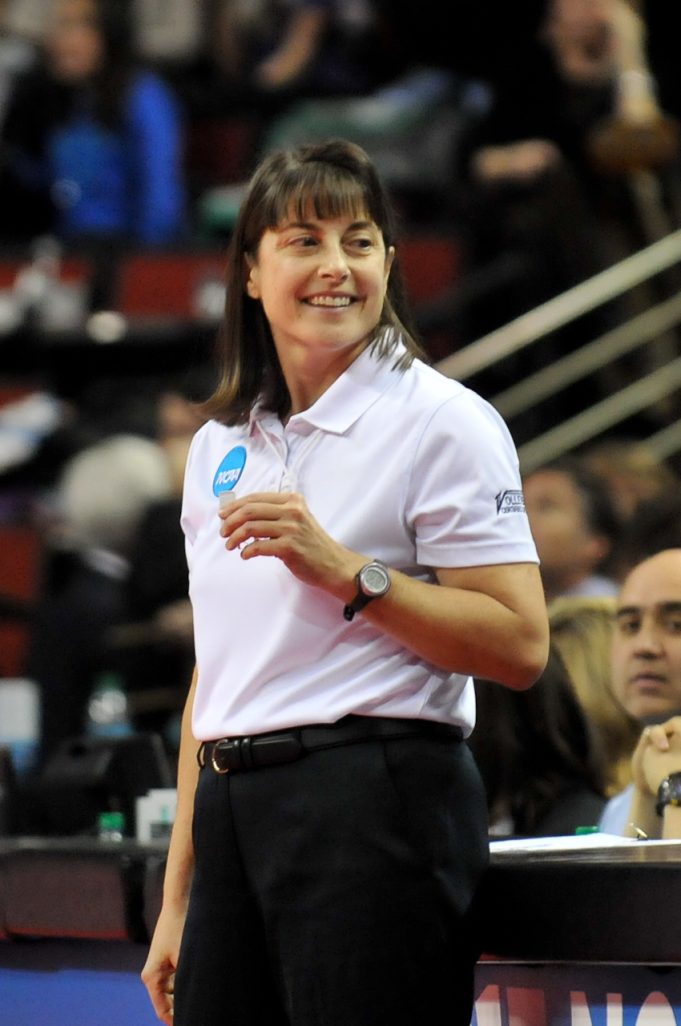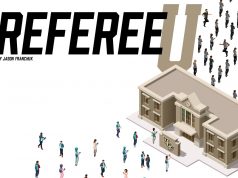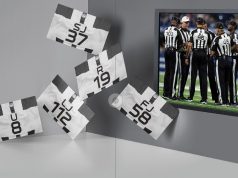By Rick Woelfel
To say Mara Wager is a busy woman is an understatement. If it’s a fall weekend, she’s likely working a women’s college volleyball tournament. If it’s a Thursday in January, she’s likely whistling a women’s college basketball game. When spring arrives, her attention turns to women’s lacrosse, where she’s working a college game or perhaps traveling to an international tournament.
It’s no secret working multiple sports requires a serious commitment of time and energy. Working three sports at the collegiate level requires an even greater level of commitment.
But Wager has been doing all this for nearly four decades now. She currently works Division I volleyball and lacrosse and Division III basketball (she previously worked Division I in that sport as well). She is regularly assigned to various NCAA tournaments and has been to final fours in all three sports (D-I in lacrosse and volleyball and D-III in basketball, lacrosse and volleyball).
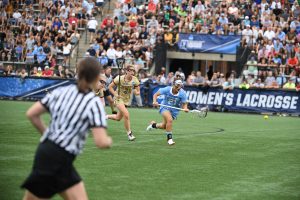
Mara Wager during the 2019 NCAA D-I Women’s Lacrosse Semi Final.
Wager says her success stems in part from her ability to compartmentalize and concentrate on the task at hand. “You walk in the door and it’s, ‘I’m here, this is what I have to focus on,’” she said. “This is what I need to do.” For much of her officiating career, Wager balanced her officiating commitments with a career as an elementary school teacher. She retired from teaching fifth grade in the summer of 2018 after a 30-year career.
She was able to make it all work because her volleyball assignments were largely on weekends, while her basketball and lacrosse trips kept her close to home when necessary. I don’t know how I was able to do that for as long as I did,” she said, “but I just had that ability to kind of be in the here and now in terms of, it doesn’t matter where you came from or where you’re going. For two hours, you can do anything for two hours.”
Growing up in Troy, N.Y., Wager was an all-around athlete. She played four sports in high school and was also a skater and ski racer (today she is a certified skiing instructor). For her and her siblings (an older sister and a younger brother), sports offered a refuge from a sometimes-difficult home life. Her father, who worked in a Ford factory, had issues with alcohol.
“Sports was one of those things in high school that kept me on the straight and narrow as a student-athlete, as well as my siblings,” she said, “and helped us kind of get through a rough patch.” Today, Wager sees officiating as a vehicle for serving student-athletes who may be facing difficult circumstances of their own. “There really have to be some other kids out there that sports are really that important to,” she said. “And to this day, that’s what I feel.”
Wager played volleyball at what was then St. John Fisher College (now University) in Rochester, N.Y., at a time when the Association for Intercollegiate Athletics for Women (AIAW) was gradually ceding its control of women’s athletics. Her last two years of college, the school competed at the NAIA level and Wager was part of two teams that qualified for the NAIA national tournament.
Following graduation, she applied to the Peace Corps but wasn’t selected because she had never traveled outside the U.S. and did not speak a second language. She returned to what had been a summer job at a community recreation center teaching swimming and water safety. She worked as a director at a day camp while also enrolling in graduate school. Eventually, Wager parlayed a master’s degree into a career in education.
She took up officiating at the suggestion of one of her high school coaches. Naturally enough, she made her debut on the volleyball court. That experience whetted her appetite for more. At the time, girls’ volleyball in New York was a second-tier sport with a “mini-season” slotted between the traditional fall and winter seasons. Looking for additional officiating challenges, Wager turned her attention to football, which her brother had played in high school. After being encouraged to take an officiating class, she spent the next decade working high school games, primarily on the wings.
Even today, a woman in a striped shirt on a football field is not a common sight. When Wager was getting started in the sport, she was a rarity. But she says she always had the support of her crewmates.
“I rarely, if at any time, had any issues with any of the crews I worked with,” she recalls. “(The schools) knew I was coming. There was always a separate locker room for me. My association made sure of that. The assigner and any referee that I worked with — they went above and beyond.”
When Wager was getting started on the gridiron, one of her compatriots was John Soffey, who went on to become perhaps the premier collegiate referee in the East and later served as the coordinator of officials for the Big East.
“People revered him,” Wager said. “He was one of the finest officials I’d ever been in a room with and the Capital District Football Officials Association kind of took on that professionalism that John exuded.”
Wager’s appetite for officiating proved to be insatiable. Over the years, she has worked no fewer than eight different sports — boys’ and girls’ volleyball, football, soccer, basketball, lacrosse, softball, track and tennis.
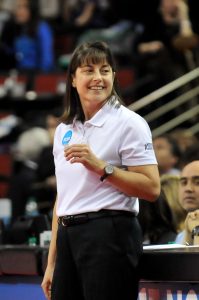 Mara Wager working R2 at the 2013 NCAA D-I Women’s Volleyball Semi Final in Seattle.
Mara Wager working R2 at the 2013 NCAA D-I Women’s Volleyball Semi Final in Seattle.
Her passion was fueled by her and her family’s interest in sports and the fact many of the people offering her encouragement and support were fellow educators, some of them her former teachers, who would encourage her to add another sport to her résumé.
“I think what really helped me was the variety of experiences,” Wager said. “I played high school soccer, so soccer came easily. My brother played football so I had some understanding of the game.
“Initially, it was my athletic background, my family’s participation in sports in general. The other interesting thing is a lot of officials, at the time I got into each and every sport, were principals, there were assistant superintendents. There were professional educators that were in the sports officiating world.”
As Wager climbed the ranks, however, decisions and tradeoffs had to be made. By 1993, she was working collegiate volleyball, basketball and lacrosse. Three years later, she was handling D-I assignments in three sports while continuing to work high school football and continuing her teaching career.
Something had to give. Following the 1996 season, Wager stepped away from football, despite the fact she had been approached by the ECAC about working college games. “I really loved volleyball,” she said, “and it was something that when I was in high school, helped keep me on track. I realized, when I started working collegiate volleyball, that I couldn’t work a Friday night (football) game and then turn up at Syracuse and work a volleyball tournament at the Division I level and have my act together. I couldn’t be the best that I needed to be. When my volleyball schedule started taking off, I gave up high school football. My volleyball career was taking off a little faster. I’m a bit of a perfectionist perhaps, and I just wanted to be the best I could be doing what I was doing.”
Today, Wager works D-I volleyball in the Big Ten, Big East, Atlantic 10, Ivy League and the Coastal Athletic Association (formerly the Colonial Athletic Association).
Working multiple sports requires spending time pouring over various rules codes and absorbing an assortment of casebooks and manuals. And Wager does additional juggling when seasons overlap; in late fall she might work volleyball and basketball the same week. In late winter/early spring she’s likely doing double duty with basketball and lacrosse.
But she is quick to point out many of the standards and practices that make for good officiating translate from sport to sport.
“Initially when I started working volleyball, the precision of the signals and the timing of the whistles would roll you into basketball,” she said. “And then the demands on the signals for women’s basketball in particular, in terms of describing the fouls and reporting to the table and the method of talking to the coaches, that was an easy rollover to lacrosse. More so than I really ever thought. Coming out of basketball, my whistle was very sharp because you’re making decisions on similar plays; block/charges, identifying defenses, man-to-man or zone.”
Whatever the sport, Wager, 60, makes it a point to maintain her fitness level, and notes it is particularly important in lacrosse.
“You really have to have it going on by lacrosse season,” she said, “because you’re only running 94 feet for basketball, whereas you’re running a football field and more for lacrosse.”
Wager’s colleagues are quick to point out she possesses intangibles that transcend rulebooks and manuals.
Mike Schmidt worked D-I basketball with Wager in the Patriot League, America East and the Big East. Today, he’s the coordinator for women’s basketball in the America East as well as the D-III Northeast Consortium and assigns Wager’s games; she has been a fixture in NCAA D-III for more than two decades and worked the Final Four in 2014.
“As an official, she’s always got your back,” Schmidt said. “Especially in some of the environments we referee in, I think that’s certainly number one. You don’t have to worry about her taking care of her primary area.
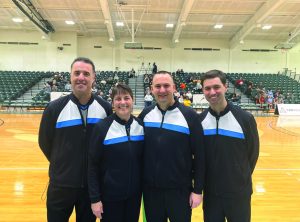 Mara Wager with her crew before an NCAA D-III Women’s Basketball game.
Mara Wager with her crew before an NCAA D-III Women’s Basketball game.
“She certainly has a great feel for the game and is also a great decision-maker.
“I think she just naturally has that ‘It’ factor and has always had that ‘It’ factor. And I think the third area where she really excels is earning the trust and confidence of coaches with her communication style.”
Schmidt says Wager’s natural athleticism has been instrumental in her success.
“I think she’s a tremendous athlete,” he said. “That’s first and foremost. She can get up and down the floor. She’s always in the right position and that certainly helps her (credibility) with coaches. She has the ability to focus on her primary matchup but also to be able to balance that with the big picture. I think that’s what probably helps her excel. She can kind of see plays develop and make decisions. Her mechanics have always been rock solid. And when you think about the mechanics and doing different sports, that’s not by accident. You have to spend some time in the book.”
“She has a no-nonsense kind of personality out there,” said Marcia Alterman, coordinator of volleyball officials for seven D-I conferences, including the Big Ten, AAC, Big East, Conference USA, MAC, Horizon League and the Missouri Valley. She notes Wager, who has worked an NCAA tournament match every year since 2007 (save for the pandemic year, 2020) and worked the D-I Final Four in 2013, has a communication style that might best be described as straightforward.
“She’s happy to explain if a coach deserves an explanation on a situation. But on the other hand, she suffers no fools and is able to manage crises very well because of that persona that says, ‘I’m not going to mess with you. I’m going to answer your questions, I’m going to give you your due regards,’” Alterman said. “She pulls that off because those characteristics have been developed by working multiple sports.”
It’s not uncommon for Alterman to pair Wager with a less-experienced partner. “I have her mentor younger officials because she’s good in that role,” Alterman said. “But on the other hand, they need to come prepared. They need to come ready to be an open book and listen and pay attention.
“She’s not going to pamper or take it easy on anybody. She’s going to tell you pretty forthrightly what you did well and what you need to work on. That’s her persona. She’s not going to tell you you’re OK when you’re not.”
Wager also serves off the court. She was an at-large member of the PAVO Board of Directors from 2008-11 and today heads the organization’s National Rating Team, while also assigning officials for several D-III conferences.
“She’s extremely professional,” Katy Meyer, PAVO’s executive director, said. “She’s extremely rules knowledgeable.
“One of the things I think makes Mara great at what she does is she’s really smart and educated in the places she spends her time, whether that be in volleyball or lacrosse or basketball.
“She has an honest, and no-frills, presence. Mara keeps things very real. There’s no fluff when you’re interacting with her. You’re going to get her straight-up opinion about something.”
But Meyer is quick to point out Wager has a knack for defusing a tense moment.
“Mara has a wonderful sense of humor,” she said, “and in a heartbeat can lighten a pretty heavy situation.”
Wager vociferously dismisses the notion that lacrosse is her primary sport. But she has had a decorated career on the field, both as a working official and a clinician. She’s worked college games since 1990 and been assigned to the NCAA tournament at some level every year since 2000, save for 2020 when the postseason was canceled due to the pandemic.
“The things I think that separate the good officials from the great ones is their ability to understand the game,” said Melissa Coyne, the national coordinator for NCAA women’s lacrosse. “They have a very high, what I call, Game IQ. It’s almost like they’re an extension of a player or coach on the field. They understand the nuances of what’s happening and they’re able to manage the game in a way that almost makes it seem like they’re not there. And (Wager) has a particularly great ability to do that.”
Wager says her success in lacrosse stems from having worked other sports.
“I attribute it to my experience in volleyball,” she said. “As an R2, working in the Power Five conferences, you have to be prepared for coach interaction.
“In basketball, when you go tableside to report, you have to be prepared to have conversations, answer questions and get right up in it when coaches are a little upset.
“My ability to convey my message with signals and whistles, that all came from experiences with volleyball and basketball.
“And I believe in my ability to communicate and say some very challenging and difficult things like, ’Hey coach we got that one wrong,’ and kind of facilitate conversations with people in the game.”
Even before she was certified by the Federation of International Lacrosse (now World Lacrosse) as an international umpire, Wager was traveling overseas and serving as an ambassador for the sport. Her first trip was to Prague in the Czech Republic in 1998.
“The 1998 European Championships were open to people who could travel,” she said. “I just fell in love with it. It was such a fantastic experience to get the cultural experience as well as the officiating camaraderie with people from other counties. We had people from all over.”
In the years that followed, Wager and her peers served as ambassadors for women’s lacrosse and were instrumental in getting the sport established in Continental Europe. Wager said that experience gave her insight into how officials in America are developed and the advantages they enjoy.
“Officials can develop in the U.S. simply because of the number of games we’re exposed to in a given season,” she said. “In other countries, they don’t have the NCAA/collegiate system happening.
“They may have some university play and then the domestic competitions that are happening with their national teams. In Europe, they would have the European championships.”
Wager says other American officials stressed the importance of giving back and nurturing the international game.
“They really instilled in me that we are here to help people and to grow the game by sharing our knowledge and our experience,” she said. North American officials would often bring extra uniforms with them when they traveled, since items like striped shirts and whistles were sometimes difficult, if not impossible, to obtain elsewhere.
“They were very envious of our solid black running shoes,” Wager recalls.
Wager herself returned to Europe in 2000 to work the European Championships, this time in Glasgow, Scotland, and earned her international umpire’s certification. Since then, her travels as an umpire and clinician have taken her to Finland, Germany, Poland and New Zealand, as well as the lacrosse hotbeds of England, Scotland and Australia. She’s officiated at numerous international tournaments and even met her partner, Shelley Maher, through lacrosse.
In a sense, Wager has come full circle. The woman who once aspired to join the Peace Corps is today serving as an ambassador of a different sort and sharing her officiating expertise with colleagues from around the globe.
“There’s so much to learn from people that have been there and done that,” she said. “If you’re with them and pay attention to the nuances, how the system works, there are a lot of lessons in each sport.
“The climate and culture in volleyball is not the same as the climate and culture in basketball, and it’s not the same climate and culture in women’s lacrosse.
“Each one has its own climate and culture, and if you can listen more than you speak and learn from people’s experience and put your head down and work hard, it usually comes to you.”
Rick Woelfel, Philadelphia, is a freelance writer and softball umpire.
Note: This article is archival in nature. Rules, interpretations, mechanics, philosophies and other information may or may not be correct for the current year.
This article is the copyright of ©Referee Enterprises, Inc., and may not be republished in whole or in part online, in print or in any capacity without expressed written permission from Referee. The article is made available for educational use by individuals.

